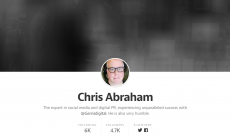This week Google introduced some significant changes to its widely used analytics offering. In a nutshell, the company is now providing a more in-depth look at the impact of social channels beyond the usual checking off of likes, followers, friends or whatever else online connections are called these days.
The Google Analytics blog tells us “The new reports bridge the gap between social media and the business metrics you care about – allowing you to better measure the full value of the social channel for your business. We wanted to help you with 3 things:
- Identify the full value of traffic coming from social sites and measure how they lead to direct conversions or assist in future conversions
- Understand social activities happening both on and off of your site to help you optimize user engagement and increase social key performance indicators (KPIs)
- Make better, more efficient data-driven decisions in your social media marketing programs”
In other words, what Google is trying to do (honestly I cannot say how well it is done, since it is too early to tell) is to do what everyone has been crying about for quite some time now. They are trying to provide analytic proof that social media is a bottom-line contributor and not a lot of marketing hype. That’s a very good goal. We are past the honeymoon phase with social media. It’s been the media darling for long enough. Now it’s like that hyped NFL QB prospect that has had 3 seasons to “get it together”. Once you are at the put up or shut up” stage you better perform. In football, performance means wins. It’s the same in business but wins are about revenue and profits not W’s and L’s.
What’s the old adage? The best way to man’s heart is through his stomach (personally I think this one should be retired because the idea of being fattened up to stay happy is a bit disconcerting, but I digress). Well, with marketers it could be re-worked to read “the to the C-suite’s heart is through their easy-to-understand contributions to the bottom line.” Not nearly as pithy but it might work, right? Google is offering marketers who use their analytics offerings that chance and it is great.
What I see as the REAL bonus for Google lies in exactly which social media sources are receiving a deep dive in analytics. Here’s the lineup from Google’s Social Data Hub.
- AllVoices
- Badoo
- Blogger
- Delicious
- Digg
- Diigo
- Disqus
- Echo
- Gigya
- Google+
- Google Groups
- Hatena
- Livefyre
- Meetup
- Read It Later
- Screen Rant
- SodaHead
- TypePad
- VKontakte
- yaplog!
Some big names. But notice the big boys that are missing. That’s right, Facebook and Twitter. These two direct and indirect competitors have had an ongoing battle with Google about their data and Google’s ability to use it as a search item first then a also as a social signal for search. That’s a pain point for Google for sure.
But wait. Aside from search, what is one place where Google cleans Facebook’s and Twitter’s clocks? Analytics. The heartbeat of the new world of marketing. There are those who do not want to give their data to Google, so to speak, so they do not use Google Analytics, but when it gets down to the vast majority of businesses, especially in the SMB space, Google Analytics is the default web measurement tool. It is practically ubiquitous.
So, follow me here. If you are using Google Analytics and basing business decisions on the data you receive through it, you may, I say may, just want to concentrate a bit more heavily on sources that can be measured well. Don’t get me wrong. I am not saying that anyone in their right mind would abandon Facebook or Twitter. That would be ill-advised to say the least.
But look at the list above again. I highlighted Google+. Why? Because now this could be the incentive for marketers to give their customers a push toward the fledgling social network so the activity can be measured more closely by the marketer. Wouldn’t it be better for Google if they had businesses promoting Google + to their customers as a place to be to get more information about the business? It sure beats trying to advertise to the great-unwashed who might simply choose to ignore Google’s message simply because they don’t get it.
It’s a lot different though when a brand suggests you try something. Imagine this scenario. I will put it in a baseball context since we are approaching Opening Day (thank you, Jesus!). As a baseball fan with a young ballplayer in my house we eat this stuff up this time of year. In fact, my son got a new Rawlings glove for this season. It’s pretty sweet. As a result, we are now following them on Facebook and are one of about 61,000 who do so. If you are Rawlings, you really don’t care which social network you get business from, so what if, now just play along, they decided to tell their fans that they are also on Google+ and that they are running specials there. What if 20% of those fans who had never given Google+ a moment of their time decide that it might be worth the effort especially if Rawlings suggested it. That’s potentially 12,000 new accounts for Google+ as a result of a brand pushing their followers there so they can get better measurements on whether they are buying anything as a result of these social media efforts.
Multiply that action by however many Google Analytics users there are and you are starting to see some real growth that could predicated on engagement and not just signing up because Google forced you to.
I get that this may be a stretch but it makes sense. If Google+ were being populated not just by the Internet industry insider type (much like Twitter once was only a tech-geek hangout by the way) but by regular folks and they were getting value through the businesses they follow then it is much more likely that they will stumble upon hangouts and other features that might endear them to Google+.
So what do you think? Is the potential real winner in the Google Analytics social media play Google+? Would love to hear your take.






